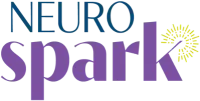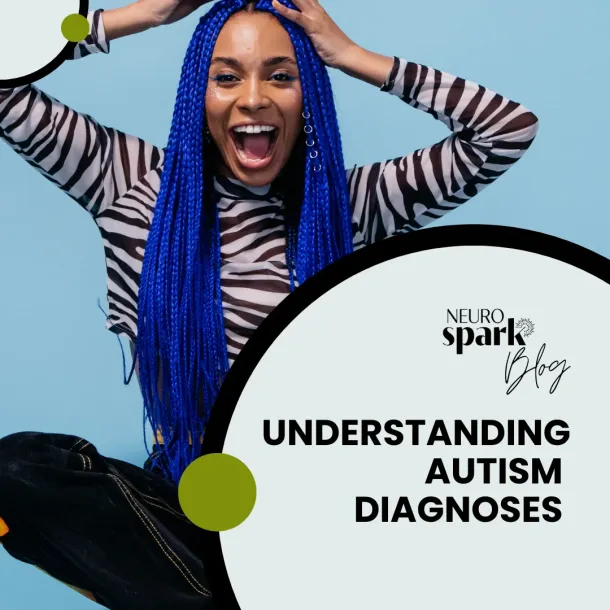How is Autism Diagnosed in Adults?

Table of Contents:
Autism is a spectrum, which means it presents in diverse ways. It can be understood by certain categories and subcategories. The two main categories can be broken down into (A) differences in social communication/interaction, and (B) restrictive/repetitive behaviors.
Read more: DSM-5-TR diagnostic criteria.
Autism is typically identified in early childhood. But for some of us, signs of autism go unnoticed or misdiagnosed into adulthood.
Social communication/interaction differences can include, but are not limited to:
- Struggling with social reciprocity (the back-and-forth of social interactions)
- Having trouble understanding social norms
- Having difficulty with nonverbal communication
- Experiencing difficulty making and maintaining relationships
Restrictive/repetitive behaviors (stims) may include, but are not limited to:
- Performing repetitive movements
- Repeatedly using the same objects
- Repeating words, sounds, or phrases
- Insisting on sameness in one’s schedules, routine, or environment
- Intense interest in specific subjects, topics, or activities
Read more: Things I Didn’t Realize Were Actually Stims
While autism can present many challenges, it can also bring strengths. Every autistic person is different and has unique talents and amazing qualities, ranging from attention to detail to a strong sense of justice to extraordinary creativity and intelligence.
Who Can Be Autistic?
Studies have shown that the most significant contributing factor associated with autism is genetics. Autism occurs more frequently in families where parents are autistic as well. Environmental factors have also been studied as potential contributors to autism, including advanced parental age, prenatal exposure to pollution/toxins, maternal health, pregnancy complications, birth complications, or very low birth weight.
Autism occurs across socioeconomic, racial, and ethnic groups. Autism is typically diagnosed in childhood, and it is estimated that undiagnosed or misdiagnosed cases occur into adolescence or adulthood.
Autism can be diagnosed by psychologists, qualified mental health providers, pediatricians, and neurologists.
Read more: Who Can Diagnose Autism?
Diagnosing autism in adults requires specialized training and understanding that autism presents differently later in life, especially for high-masking adults and/or minorities. The diagnostic assessment process varies by provider. Some evaluations require interviews with primary caregivers or close family members, while others may include the ADOS. (The ADOS is often referred to as the gold standard in autism assessment, but it isn’t great for adults.) You can read more about our affirming assessment procedure here. NeuroSpark Health believes receiving an accurate diagnosis of autism often helps a person make sense of past and current challenges, identify strengths and differences, and find needed support.
Read more: Roadmap to Diagnosis
Support Options Available for Autistic Adults
While autism presents challenges relative to how a person experiences and interacts with the world, it’s important to recognize that with the appropriate supports in place, one can embrace their neurodivergence and live a life that is fulfilling, safe, and meaningful to them.
Autism is not a disease that needs to be cured, and not every autistic person requires professional assistance just because they are autistic. For those who do wish to receive professional help, support for autistic adults should be affirming and collaborative. Strategies include:
- Autism-affirming therapy (5 Reasons it Could be Life-Changing)
- Neuro-affirming coaching
- ADA / Disability accommodations
- Occupational therapy
- Treating co-occurring conditions
- Connecting with community
NeuroSpark Health Offers Expert Diagnostic Assessments that Respects the Individuality of Every Person
At NeuroSpark Health, we come from a lived experience perspective and a place of zero judgment. We would love to support you through an autism assessment, autism-affirming therapy, or coaching.
We pride ourselves on authenticity. We are neurodivergent-led and neurodivergent-owned. We value lived experience. We pride ourselves on creating an environment that is safe and affirming for all people, especially neurodivergent adults from marginalized communities.
Contact our team today for more information or to schedule an initial consultation.

Julie Landry, PsyD, ABPP
One Spark Can Light a Fire
Diagnosis can be the catalyst for significant momentum. It can represent a turning point for your life, where you can move forward equipped with new knowledge about yourself and a new framework to guide you in your journey.
A formal assessment provides an incredible opportunity to gain knowledge about who you are and how you see the world.



